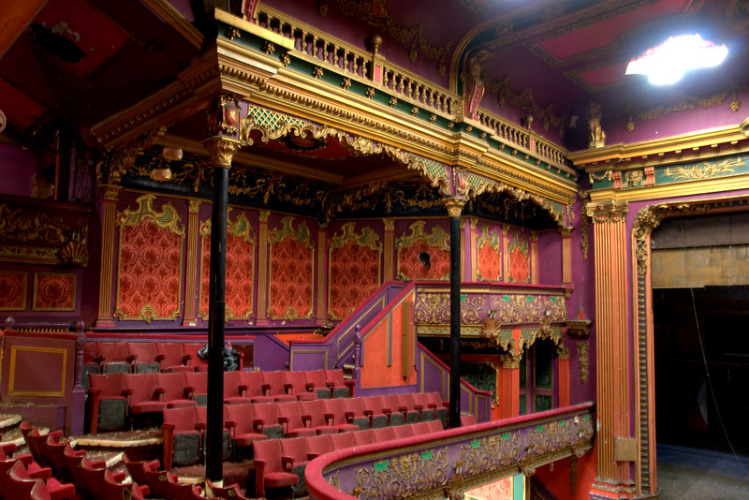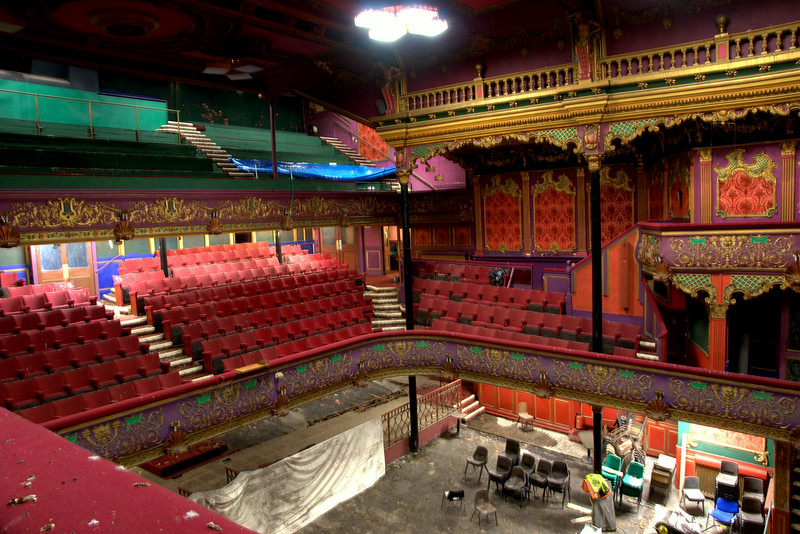After being rescued from auction earlier this year, Hulme Hippodrome’s doors may soon be open the public once again.
Spearheading the project is campaign group, Save Hulme Hippodrome, who have ambitious plans to return the 120 year-old theatre to the community.
Hulme Hippodrome opened in 1901 as the Grand Junction Theatre and became an important hub of entertainment and luxury to the area’s working class residents.
It formed part of the Broadhead Circuit, a family of 17 venues across Manchester and the North-West that showcased music and variety acts in the early 20th century.
In 1902, The Hulme Playhouse opened next door and later became the BBC studio where The Beatles recorded their radio debut.
The Hippodrome itself was the Broadhead’s headquarters and is lauded for its bright Rococo plaster work, now the last of its kind.
The Theatres Trust added Hulme Hippodrome to it’s Risk Register in 2006 where it remains with 31 other theatres across the UK, 12 of which are in North West England.
Claire Appleby, Architectural Adviser at the Theatres Trust said that in the 16 years before the charity was established, over 800 theatres were lost in the UK.
“They’re either demolished or irreversibly altered so that they can never be in theatre use again,” she said.
“What we find is that these theatres are really at the heart of their local communities, there’s a lot of local love for these buildings and people passionate about them who would like to seem them restored, reopened, and integral again to the local area and to the lives of the people in that local area.”
As the popularity of variety performance fell in favour of cinema in the mid-20th century, former Broadhead theatres were sold off, and many are now disused or have been demolished to make way for new developments.
Fearing the Hippodrome could share the same fate Save The Hulme Hippodrome knew they had to act.
Campaign Manager Paul Baker is part of NIAMOS, an arts and culture project based in The Playhouse.
He explains that restoring the Hippodrome is a commitment to Hulme as a community.
“It’s been knocked down and blitzed and redeveloped and redeveloped again and redeveloped again,” he said.
“It’s a story of constant trauma essentially, community trauma as well as individual trauma and to address that we need a beating heart for the community and the building represents that heart.”

The Hippodrome ceased to be a working theatre in the 1960’s and subsequently became a bingo hall and snooker club.
In more recent years it was used as a church by its current owner, Gilbert Deya Ministries, and finally occupied by squatters until 2018.
Baker believes the attempted sale of the building was highly dubious, saying that two trustees from Gilbert Deya attempted to sell the building without the permission of the board to a purchaser who is undisclosed bankrupt.
The seller claimed the Grade II listed building had planning permission for housing but after intervention from the Manchester City Council Planning Department and from the Charities Commission, the sale was halted on auction day.
Baker and the campaign intend for the building to become a community asset, and hope to turn part of it into a Museum of Manchester Musical Art.
“Not only have we got the building, but the building where the Russell Club used to be, which predated the hacienda,” he said.
“Where best could you put something than in a building that represents our working class roots.”
The Russell Club pub was demolished in 2001 and was best known as the birthplace of Factory Records and hosting cult Manchester band Joy Division’s first gigs.
Despite lofty aspirations, architectural designer Faz Barber says that restoring the building could take years.
“It’s a massive job,” he said.
“There’s just loads and loads of mess in there, tonnes and tonnes of stuff from when the squatters were there”.
“There’s piles and piles of rubbish that needs to be disposed of.”

The building too is in a state of disrepair; holes in the roof have caused water damage and it lacks electricity and running water.
Its owner put up stud partition walls and made office spaces in the backstage area.
Above all, the group pledge to maintain the original Rococo plaster work.
“The squatters graffitied over some of it and some it has been quite badly damaged,” says Barber.
“It’s got amazing plaster work inside which needs to be preserved because it is one of the reasons why it is a listed building.”
Barber stresses that the Hippodrome should become a “space for all things creative” including an academy encouraging young people to study theatre production.
“It’s begging to be used and ready to be brought back to life in a way that young people can get into,” he said.
The campaign hope to turn other areas of the building to a library, a bakery and an employment academy for ex-homeless, expanding on some of the community activities taking place at the Playhouse.
Baker even hopes to employ local builders to work on construction and to create apprenticeship opportunities for young people.
The campaign has now crowdfunded more than £17,000 in support of their restoration efforts and next they plan to have the building valued and surveyed to help achieve their vision of a sustainable, community based building.
“The building’s like a Pandora’s box,” said Barber. “I still don’t think we’ve seen the potential there is in the whole of the building yet.”
Photo credit: True British Metal (Flickr)



